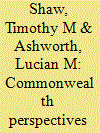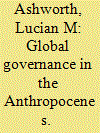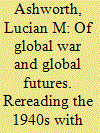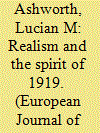| Srl | Item |
| 1 |
ID:
099563


|
|
|
|
|
| Publication |
2010.
|
| Summary/Abstract |
The parallel development of the inter- and non-governmental Commonwealths on the one hand and the field of International Relations and its oldest journal, The Round Table, on the other, should not go unnoticed at the start of the second decade of the century. This article suggests that the Commonwealth nexus has always constituted a distinctive perspective and debate in both the metropole and the rest of the Commonwealth's expanding official and unofficial networks. The Commonwealth 'School' both reinforces and contrasts with other non-US and non-hegemonic approaches presently animating the field.
|
|
|
|
|
|
|
|
|
|
|
|
|
|
|
|
| 2 |
ID:
189883


|
|
|
|
|
| Summary/Abstract |
This article adumbrates how we can re-envision global governance in the Anthropocene. The first section explores the plurality of Anthropocenes through an initial analysis of the Great Transformation since 1950. The second section focuses on what this means for global governance through insights from the history of international thought. The first insight comes from earlier works by the international functionalists, who emphasized process over goals. The second is found in the international political geography of Derwent Whittlesey, who outlined how we could take in ecological concerns through a four-dimensional view of the industrial world. Here I will also stress the growing importance of the concept of waste and refuse in global governance, a concern that becomes visible when we think about global politics in four dimensions. The final concluding section underscores how a messy and unprecedented crisis requires an equally messy and unprecedented approach to global governance.
|
|
|
|
|
|
|
|
|
|
|
|
|
|
|
|
| 3 |
ID:
119647


|
|
|
|
|
| Publication |
2013.
|
| Summary/Abstract |
Before 1950, International Relations (IR) was a thoroughly interdisciplinary field. Geographers played a key role in the early development of IR, although they are now little known within the discipline that they helped to found. This article explores the pioneering work of three geographers in IR-Isaiah Bowman, Halford J. Mackinder and Derwent Whittlesey-and sets out to reclaim a lost chapter in the history of IR that questions the tendency to reduce IR to a conflict between realism and idealism.
|
|
|
|
|
|
|
|
|
|
|
|
|
|
|
|
| 4 |
ID:
174069


|
|
|
|
|
| Summary/Abstract |
Not very far from where I live in St. John’s there is a place called Placentia Bay. It is in this bay on August 1941 that the British Prime Minister Winston Churchill and the US President Franklin Delano Roosevelt met. Although the United States was still formally neutral (and the Soviet Union was not represented, although along with other Allied powers it later agreed to the principles), it was on the rendezvousing warships that the two leaders and their aides came up with a set of Allied war aims that would come to be known as the Atlantic Charter. While historians still debate the Charter’s role in the development of Allied war aims, its symbolic role in post-war reconstruction underscore the importance of the ‘trans-war’ period of the 1930s and 1940s for the development of the modern world.
|
|
|
|
|
|
|
|
|
|
|
|
|
|
|
|
| 5 |
ID:
112422


|
|
|
|
|
| Publication |
2012.
|
| Summary/Abstract |
In a recent article in International Affairs Duncan Bell argued that the work of Peter Galison in the history of science could be usefully applied to the study of the history of International Relations (IR). In this article I take up Bell's challenge, claiming that Galison's post-Kuhnian history of science approach can be used both to understand the history of IR and to replace the ultimately confusing notion of 'paradigm' in the study of IR theory. Galison's method of using 'microhistories' to explore the workings of 'subcultures' in science is applied to the case study of liberal socialism in interwar IR. Through this case I argue that microhistories can help us understand why certain subcultures in IR theory thrive, and others decline. This understanding in turn could help us comprehend the state of currently active subcultures in IR, and give us an alternative to the intellectually unhelpful concept of 'paradigm'.
|
|
|
|
|
|
|
|
|
|
|
|
|
|
|
|
| 6 |
ID:
105950


|
|
|
|
|
| Publication |
2011.
|
| Summary/Abstract |
Recent analyses of interwar International Relations (IR) have argued that there was no realist-idealist debate, and that there is no evidence of a distinct idealist paradigm. Less work has been done on realism in the interwar period. This article analyses the thought of one particular early 20th-century realist: Halford J. Mackinder. A product of the development of political geography, and a major influence on American strategic studies, Mackinder is best known for his Heartland thesis, which has been interpreted as environmental determinism. Yet, Mackinder's realism is a complex mix of geopolitical analysis and the influence of ideas on human action. His concepts of organizer and idealist foreign policy ideal types pre-date Carr's realist-utopian distinction by two decades, while his interpretation of the realities of international politics is at odds with Morgenthau's realism. A closer analysis of Mackinder's realism (1) underscores the links between geopolitics and realist strategic studies; (2) demonstrates the diversity of realist approaches in interwar IR; and (3) shows that it was possible to be a realist and also support the League of Nations. There are limits to Mackinder's usefulness to 21st-century IR, but an understanding of his brand of realism is necessary for a fuller understanding of the development of realism as a 20th-century school of thought.
|
|
|
|
|
|
|
|
|
|
|
|
|
|
|
|
| 7 |
ID:
071467


|
|
|
|
|
| Publication |
2006.
|
| Summary/Abstract |
International Relations (IR) textbooks often make reference to an idealist paradigm in interwar IR. This article argues that an idealist paradigm did not exist, and that interwar references to idealism or utopianism are contradictory and have little to do with defining a paradigm. Not only is there no idealist paradigm in IR at this time, but authors from the interwar period that have since been dismissed as idealists rarely share the attributes assigned to idealism or utopianism by later writers. If IR scholars are serious about understanding the history of their discipline then they will have to stop applying misleading and anachronistic terms like idealism.
|
|
|
|
|
|
|
|
|
|
|
|
|
|
|
|